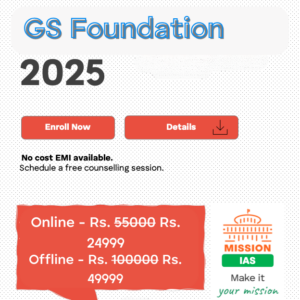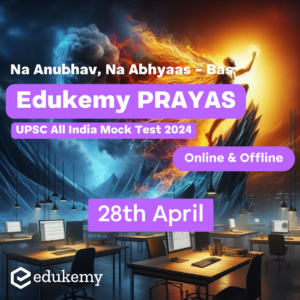Analyzing the UPSC (Union Public Service Commission) syllabus is a crucial step for any aspirant preparing for the prestigious civil services examination in India. The UPSC syllabus is extensive and covers a wide range of subjects, encompassing various dimensions of knowledge and skills. To effectively navigate through this vast syllabus, candidates must undertake a meticulous analysis. Firstly, breaking down the syllabus into its constituent parts helps aspirants understand the weightage of different topics and identify key areas of focus. This analysis aids in creating a well-structured study plan, ensuring that candidates allocate sufficient time to each subject based on its importance in the examination. Additionally, understanding the syllabus is instrumental in developing a strategic approach to exam preparation, allowing aspirants to prioritize their efforts on areas with higher marks potential. It also provides clarity on the type of questions asked, enabling candidates to tailor their study resources and strategies accordingly. In essence, a thorough analysis of the UPSC syllabus is indispensable for effective preparation, helping aspirants streamline their efforts and increase their chances of success in one of the most challenging and competitive examinations in the country.
It is important to prepare for the Civil Services Examination with focus. It is important to focus your efforts so that the exam meets both the requirements and the expectations of the examiner. Let’s not forget our college days. Wasn’t it important to read the syllabus copies for all semesters? The UPSC Civil Services Examination is not an exception. This article explains in detail the analysis of the UPSC Syllabus.
How can I analyze a topic in UPSC?
To analyze a topic, you can do the following:
- Start by reading the subheads that relate to the topic in the syllabus.
- To get an idea of the types of questions that are being asked about this topic, look through the papers from the previous year.
- Think about the possible dimensions.
- The standard sources can be used to help you understand the topic.
- Rewind to step 1 and verify that all major heads have been covered.
- You can build layers of understanding by referring back to the same material multiple times or to other sources if you don’t understand a section of the syllabus.
- To check your preparation and identify any deficiencies, join a test series.
What is the importance of the UPSC syllabus?
Many aspirants initially believe that Indian heritage and culture are part of the General Studies-I (Indian Heritage and Culture, History, and Geography of the World and Society). These topics are only included in the prelims exam. It is therefore essential to have a clear understanding of the scope, nature, and extent of the syllabus.
The UPSC analysis provides objective clarity, which allows one to understand what to read and not to read as well as what sources one should refer to. This is also true for optional subjects.
How do I proceed?
- Aspirants should take a printed copy of the Civil Services Examination syllabus to make sure they have it handy.
- It’s also helpful for aspirants to break down each topic into subtopics and then refer to specific sources for each topic. It is easier for aspirants, once this framework has been established, to navigate the vast UPSC syllabus and the Civil Services Examination.
- Analyzing question papers from prior years can help you to see the whole syllabus in a better light. Often, it is possible to determine the true breadth of the syllabus by looking at questions that have been asked about the topics.
What is UPSC analysis?
Aspirants should analyze the UPSC Syllabus prior to starting the exam preparation. This is essential in many ways. Below are some of the benefits of studying the IAS Syllabus before starting the exam preparation.
- The UPSC will notify the candidates of the details in an official notification. The syllabus can be viewed by candidates to assess their knowledge and identify their weaknesses.
- The syllabus provides a timetable and study plan that can be used to help candidates prepare for each subject. This ensures that the topic is covered in full.
- Candidates will find it beneficial to select an optional subject by going through all of the options available. Based on their strengths, they can then choose the most appropriate optional subject.
Is memorization of the UPSC syllabus necessary?
UPSC is a difficult exam. It is a complex syllabus. It is necessary to be able to concentrate on several areas at once: GS, current affairs, essays, answer writing, and subject. A beginner may wonder if it is possible to cover everything. Please understand that almost everyone feels intimidated. The key to navigating through it is creating a strategy.
Below are some of the important strategies you can use to remember what you’ve learned during the preparation for the UPSC civil service exams.
Mind Maps
Mental associations are the fuel for creativity and intelligence. How can you create mental associations? One of the best methods is “Mind Maps”. Make a quick overview of all the connections that are related to the topic. This will allow you to remember all the details and even the sequence. Drawing diagrams makes it easier to remember. It is easier to remember information when you can visualize it!
You can relate abstract topics, such as inflation, to real-life situations. For example, you could create an example of how you bought onions, and suddenly the prices were twice what you expected.
All this new information, such as the Iran Sanctions, links to your existing knowledge of India’s dealings with the IAEA earlier or India’s problems with nuclear and petroleum fuels. Your learning will be stronger if you can make strong connections to both real-life examples as well as old familiar knowledge. The higher your chances of recalling information in crunch time (exams), the better!
Make flashcards
Flashcards are great for revision. Flashcards are a quick way to test your knowledge of facts, formulae, and definitions. Flashcards are simple to create and can be used multiple times. Keep flashcards short and simple. Bullet points are the best!
Study it as if you were teaching it.
This will allow you to plant new knowledge and strengthen existing knowledge.
Teaching is the best way of remembering things. When studying, think of it as if you are trying to explain the topic to someone else in simple language. This will allow you to ask questions and help you understand the topic better. After you’re done reading, explain it to someone else. If you can do it easily, you will have a good understanding of the topic and will be able to recall the information for a long time.
The Key to Success is Revision.
Revisiting is key to recalling what you’ve learned. It is possible to spend three hours learning about a topic you have never heard of before. The first revision will take you less than three hours to finish the topic.
In the second revision, it takes longer, but so does the third revision. Multiple revisions will help you to keep the topic in your mind for life. This will allow you to think coherently while writing the IAS exam.
FAQ’s
1. What is the significance of analyzing the UPSC syllabus?
Understanding the importance of analyzing the UPSC syllabus is crucial for aspirants. This FAQ could cover the rationale behind analyzing the syllabus, emphasizing how it serves as a roadmap for exam preparation. It could also touch upon how a comprehensive understanding of the syllabus helps aspirants prioritize topics and allocate time efficiently.
2. How can I effectively break down the UPSC syllabus for analysis?
This question addresses the practical aspect of syllabus analysis. It could provide guidance on how to categorize topics, identify overlaps between subjects, and recognize recurring themes. Explaining how to deconstruct the syllabus into manageable sections helps aspirants create a structured study plan.
3. What role does syllabus analysis play in the UPSC exam strategy?
This question explores the strategic aspect of syllabus analysis. It could discuss how a deep understanding of the syllabus helps aspirants formulate a well-informed exam strategy. This may include insights on choosing optional subjects, prioritizing areas of strength, and tailoring preparation to align with the UPSC’s expectations.
4. How does syllabus analysis aid in resource optimization?
Efficient resource utilization is crucial for UPSC exam preparation. This FAQ can delve into how analyzing the syllabus helps aspirants identify essential study materials, recommended books, and online resources. It could also address the importance of avoiding irrelevant or excessive study materials, thereby optimizing time and effort.
5. Can syllabus analysis contribute to better time management during UPSC preparation?
Time management is a common concern for UPSC aspirants. This question could explore how a detailed analysis of the syllabus assists in creating a realistic study schedule. It may include tips on allocating time based on the weightage of topics, ensuring comprehensive coverage, and incorporating regular revisions to enhance retention.
In case you still have your doubts, contact us on 9811333901.
For UPSC Prelims Resources, Click here
For Daily Updates and Study Material:
Join our Telegram Channel – Edukemy for IAS
- 1. Learn through Videos – here
- 2. Be Exam Ready by Practicing Daily MCQs – here
- 3. Daily Newsletter – Get all your Current Affairs Covered – here
- 4. Mains Answer Writing Practice – here


